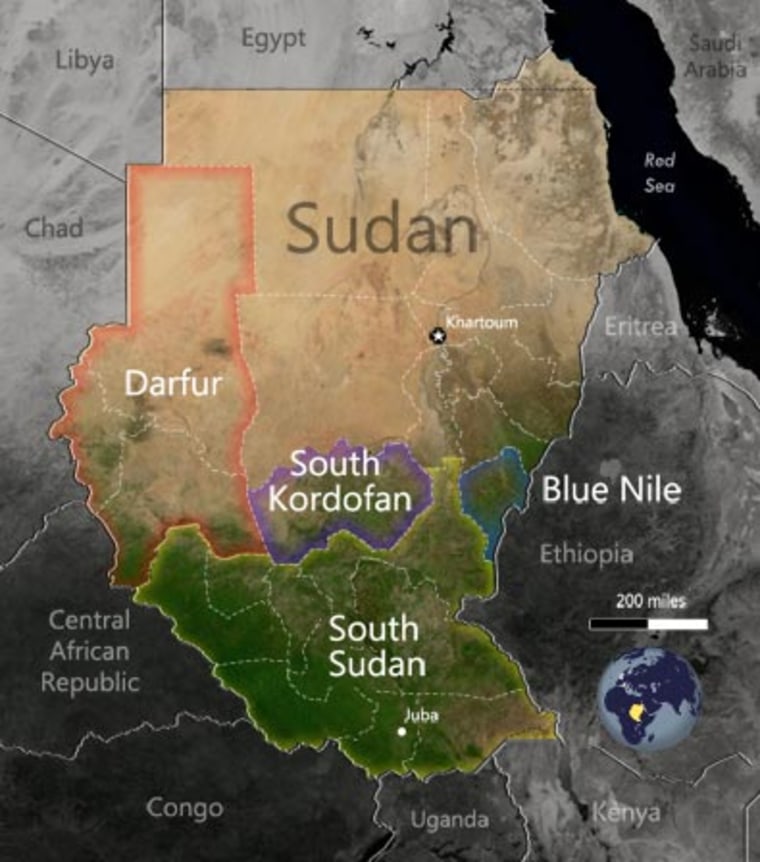Saturday meant that South Sudan and its black tribesmen would for the first time be linked politically with sub-Saharan Africa.
Kenya and Uganda are already laying strong economic ties with their northern neighbor, an oil-rich country that may one day ship its oil to a Kenyan port, instead of through the pipelines controlled by Khartoum.
"From today our identity is southern and African, not Arabic and Muslim," read a hand-painted sign that one man carried as he walked through the crowds.
South Sudan first celebrated its new status with a a raucous street party at midnight. At a packed midday ceremony, the speaker of parliament read a proclamation of independence as the flag of Sudan was lowered and the flag of South Sudan was raised, sparking wild cheers from a crowd tens of thousands strong.
"Hallelujah!" one resident yelled, as other onlookers wiped away tears.
The U.S. and Britain, among others, announced their recognition of South Sudan as a sovereign nation.
Sudan President Omar al-Bashir, a deeply unpopular man in Juba, arrived to a mixture of boos and murmurs. He stood beside Kiir and smiled during the ceremony, and said in a speech that he respected the south's choice to secede, even as he prodded President Barack Obama "to meet his promise and lift the sanctions imposed on Sudan."

The U.S. has promised economic and political rewards to Khartoum if it allows the south to secede peacefully, but military standoffs in the contested border region of Abyei and new fighting in South Kordofan — a state in Sudan with many south-supporting residents — risk new north-south conflict. The U.S. has indicated that those issues need to be resolved before normalization of relations occur.
In a statement, Obama said he was "proud" to formally recognize the Republic of South Sudan "as a sovereign and independent state," NBC News reported.
A 'dream realized'He recalled Martin Luther King reflecting on the first moment of independence on the African continent in Ghana.
"I knew about all of the struggles, and all of the pain, and all of the agony that these people had gone through for this moment," the president quoted King as saying.
Obama said that now, decades later, "we are moved by the story of struggle that led to this time of hope in South Sudan, and we think of those who didn't live to see their dream realized."
"Today is a reminder that after the darkness of war, the light of a new dawn is possible. A proud flag flies over Juba and the map of the world has been redrawn. These symbols speak to the blood that has been spilled, the tears that have been shed, the ballots that have been cast, and the hopes that have been realized by so many millions of people," he said.
Obama said many Americans had been "deeply moved by the aspirations of the Sudanese people, and support for South Sudan extends across different races, regions, and political persuasions in the United States."
Years of war have flooded South Sudan with weapons.
In a possible sign of the South's new allegiances, the crowd included about 200 supporters of Darfur rebel leader Abdel Wahed al-Nur, whose forces are fighting Khartoum in an eight-year insurgency just over South Sudan's border in the north.
The supporters of Nur's rebel Sudan Liberation Army faction stood in a line chanting "Welcome, welcome new state," wearing T-shirts bearing their leader's image. One carried a banner reading "El Bashir is wanted dead or alive."
Traditional dance groups drummed and waved shields and staffs in a carnival atmosphere.
"I am very pleased," said Joma Cirilow, 47, his hand on his son's shoulder. "Do you want to be a second-class citizen? No, I want to be a first-class citizen in my own country."
'Join the nations of the world'
Christian priests in full robes blessed the ceremony site in central Juba where a large statue stood draped in a flag near the mausoleum of the south's civil war hero John Garang.
"Today we raise the flag of South Sudan to join the nations of the world. A day of victory and celebration," Pagan Amum, the secretary general of the South's ruling Sudan People's Liberation Movement (SPLM) told Reuters.
"Free at last," said Simon Agany, 34, as he walked around shaking hands. "Coming away from the north is total freedom."
North Sudan's Khartoum government was the first to recognize the new state on Friday, hours before the formal split took place, a move that smoothed the way to the division of what was, until Saturday, Africa's largest country.
The recognition did not dispel fears of future tensions.
Northern and southern leaders have still not agreed on a list of issues, most importantly the line of the border and how they will handle oil revenues, the lifeblood of both economies.
At the stroke of midnight the Republic of Sudan lost around three quarters of its oil reserves, which are sited in the south, and faced the future with insurgencies in its Darfur and Southern Kordofan regions.
In Khartoum, just before the split, Bashir, who now leads just the north, told journalists he would attend the independence celebrations later in the day in Juba.
"I would like to stress ... our readiness to work with our southern brothers and help them set up their state so that, God willing, this state will be stable and develop," said Bashir.
Bashir's presence at the ceremony, while a signal of the north's goodwill, will be an embarrassment to some Western diplomats. The International Criminal Court has issued an arrest warrant for Bashir, on charges of war crimes in Darfur.
Analysts have long feared a return to war if north/south disputes are not resolved.